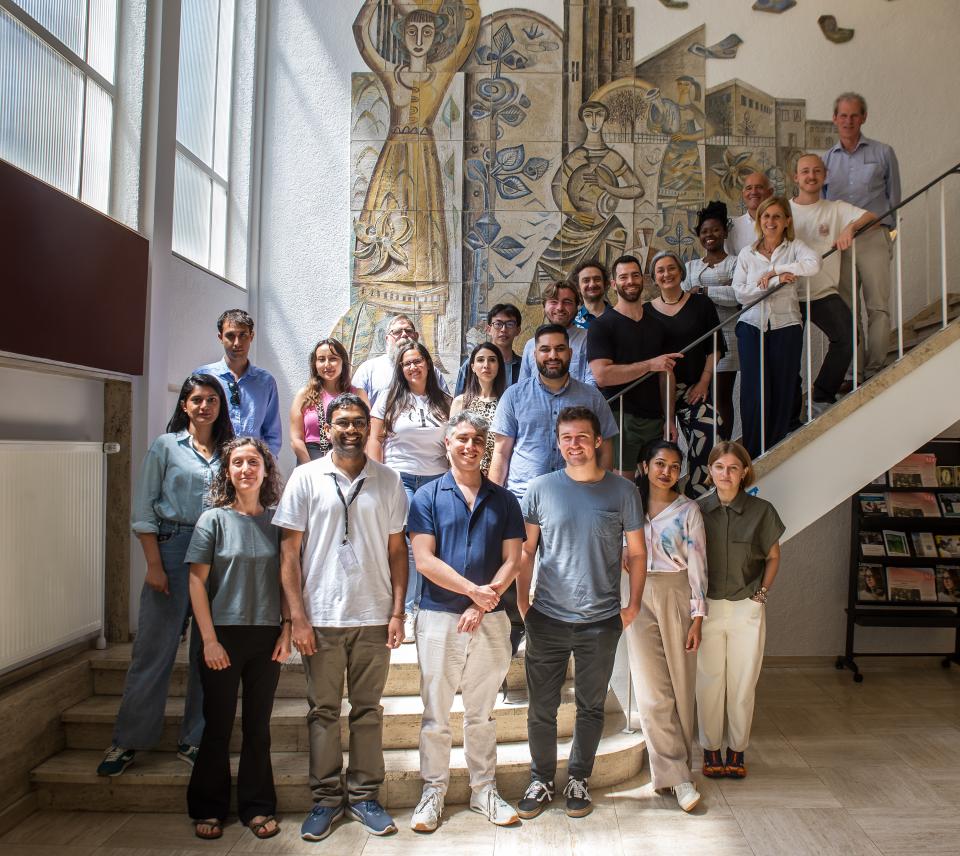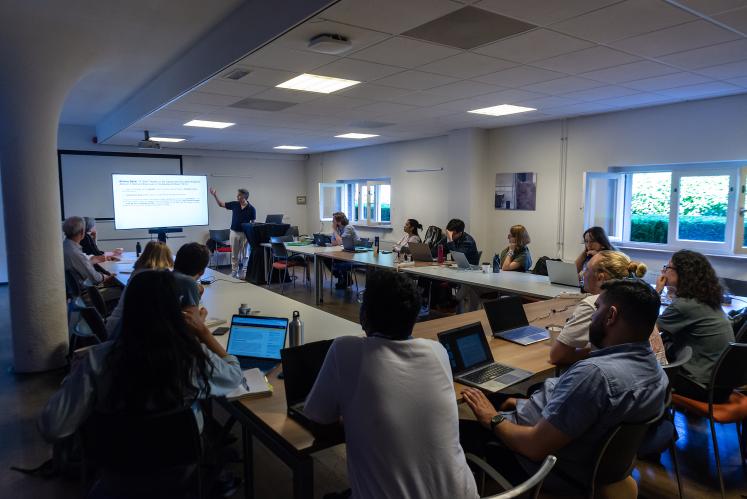Navigating the green and digital transitions requires more than political will—it demands a new generation of researchers and policymakers armed with a sophisticated understanding of their complex economic underpinnings.
Responding to this critical need, the PhD Summer School on the Economics of the Green and Digital Transitions, an intensive event hosted by a consortium of leading institutions including LUISS University, UNU-MERIT, and the University of Strasbourg, recently concluded a successful and intellectually vibrant week. The school convened a select group of PhDs to engage with the frontier of innovation economics, industrial policy, and international development, providing the theory and tools needed to design effective innovation policies for a global Europe.
A Synthesis of Frontier Knowledge
The success of the summer school was built on an ambitious curriculum, which presented a holistic view of the twin transitions. The lectures covered both the macro technological developments and the micro impacts in Europe and developing countries.
The Macro-Foundations of the Twin Transitions:
Participants were first grounded in the twin transition's big-picture technological and scientific dynamics. The sessions explored the nature of technological evolution, using advanced methods like main path analysis of patent citation networks to trace the real-world technological trajectories of green and digital innovations (Prof. Bart Verspagen), and an in-depth analysis of the scientific evolution of scientific research (Dr Moritz Mueller and Prof. Robin Cowan). This provided a robust framework for understanding how technologies emerge, distinguishing between incremental improvements and radical breakthroughs.
Bridging technology and sustainability, Dr. Stefano Bianchini presented their work on the complex relationship between Advanced Digital Technologies (ADTs) and the Sustainable Development Goals (SDGs). Leveraging publications and a pioneering survey of over 10,000 researchers, their analysis showed that technologies like IoT and computing infrastructure negatively affect energy-related goals (SDG7), providing a vital, evidence-based map of the trade-offs inherent in the twin transition.
This technological lens was paired with a deep dive into the social dimension. Prof Bart Verspagen presented emerging evidence on the role of income distribution in the relative contribution of diverse consumers to greenhouse gas emissions through input-output relations to produce those final goods and services. Focusing the analytical lens on income inequality, Dr. Tania Treibich used comprehensive data to contrast trends within Europe and against the US, discussing the impact of green policy on distributional outcomes and the use of agent-based models (ABMs) to simulate how green policies can be designed to tackle both emissions and inequality.
Delving into the core drivers of economic growth, Dr. André Lorentz presented a re-examination of the Kaldor-Verdoorn law for the age of AI. Crucially, they found that robotisation enhances this effect, strengthening the channels through which mechanisation and aggregate demand boost productivity. Digging deeper into the underlying mechanisms with an ABM exploring "Humans vs. Machines' learning," he showed that such a boost can come at the cost of labour market polarisation and higher unemployment.
Rounding out the macro-view, Prof. Maria Savona demystified the AI revolution, distinguishing between Gen-AI and proactive Agentic AI and exploring how the digital transition shifts our understanding of knowledge from a collective, human-centric process to one of informational scale. Her lectures also grounded the digital world in physical reality, examining the geopolitics and economics of digital infrastructures like data centres (DCCS) and the strategic questions raised by the emerging "Data Haven" hypothesis.

The Micro-Level Realities: Firms, Labour, and Institutions:
Building on this foundation, the program drilled into the tangible impacts on firms, workers, and markets. The mechanics of globalisation were unpacked through detailed input-output analysis for mapping Global Value Chains (GVCs). Lectures by Dr. Filippo Bontadini and Prof. Valentina Meliciani gave students the methodologies to measure critical trends like nearshoring and far-sharing. A key empirical takeaway was the unique pattern of European integration: increasingly sourcing from within the continent (nearshoring) while depending on demand from outside (far-sharing)—a crucial insight for Europe's strategic autonomy debate.
The impact on labour markets was a central theme. Dr. Tommaso Ciarli and his collaborators presented cutting-edge research that uses semantic analysis to measure digital technology exposure and adoption across Europe. The analysis distinguished between labour-saving and labour-augmenting technologies, providing a nuanced view of their polarising effects on different skill groups.
Finally, Prof. Carlo Pietrobelli's work provided the institutional framework, showing that a robust Quality Infrastructure—comprising standards, metrology, and accreditation—is not a bureaucratic afterthought but an essential, measurable component of the National Innovation System. A well-developed infrastructure is fundamental for firm-level innovation, enabling companies to upgrade, compete, and integrate into high-value global supply chains.
[Quote from a faculty member, Prof. Maria Savona: "Understanding the twin transitions requires us to see them not as separate forces, but as a deeply intertwined system. The future of industrial policy lies in mastering the feedback loops between technology, inequality, and the very infrastructure of the digital economy."]
Cultivating the Next Generation of Research
While the faculty lectures set the stage, the PhD school's success lies in its participants' work and learning. The student presentation sessions revealed a cohort tackling some complex questions at the intersection of economics, policy, and the twin transitions. Their research showcased a blend of theory and empirical analysis, organised around several key themes:
Re-examining the Macro-Structure: Research delved into the fundamental rules of the global economy. This included a novel theoretical formalisation of the drivers of global growth through trade, and a revision of the Kuznets Curve, providing new explanations for the recent rise in inequality in advanced economies, driven by within-sector dynamics in the service economy.
The New Realities of GVCs and Firm Strategy: Students presented empirical work on how firms navigate today's complex global landscape. Thes included inter-country input-output data to show how increased digital inputs can help European sectors upgrade their position in GVCs; the divestment behavior of over 5,000 MNEs, demonstrating that peer effects within corporate networks are a crucial driver of both subsidiary exits and downsizing; and how FDI and geopolitical distance shape US firms' knowledge sourcing strategies in the green and digital sectors.
Quantifying the Green and Digital Impacts: A strong focus was placed on the tangible outcomes of the transitions. These included a study of European SMEs to show that Industry 4.0 adoption boosts both green and social innovation, which in turn drives turnover and employment growth; analysis of what drives corporate decarbonisation, finding that intangible assets and environmental innovation have stronger effects for high-polluting firms; study of the speed of green technology diffusion, finding that while technological complexity can create delays, strong environmental policy can significantly accelerate the process; and evidence for the critical role of migrant inventors in fostering green technology diversification across US regions.
The Primacy of Policy and Regulation: A few presentations clearly focused on actionable policy. This included a comprehensive legal and institutional analysis of how the EU's data regulation framework can be better leveraged to reinforce the twin transition and a roadmap for developing peer-to-peer electricity trading in Georgia.
Each student received detailed, constructive feedback from the senior faculty, creating a unique mentorship environment.
[Quote from a student participant: "I highly recommend this Ph.D. Summer School for other students in my field. The lectures were highly relevant and at the forefront, offering valuable insights into the latest research trends and emerging topics in the field. Moreover, the invited discussants were exceptionally professional and provided constructive, in-depth feedback that significantly contributed to improving our research."]
Building a Lasting Community of Practice
Beyond the intense teaching, the summer school emphasised connection and collaboration through several informal social events, which enabled a group of individual researchers to form a durable network of peers and mentors.
[Quote from an organiser: Filippo: "Our goal was not just to transmit knowledge, but to build a network. The policy challenges of the next decade will require collaborative, international teams, and we are proud to have laid the groundwork for many of those future partnerships this week."]
An Investment in Our Collective Future
By synthesising frontier knowledge, training the next generation of researchers, and building a strong professional community, the PhD Summer School on the Economics of the Green and Digital Transitions represents an important investment in Europe's intellectual infrastructure. It has successfully provided a new cohort of economists with the skills, insights, and connections to design the innovative, inclusive, and effective policies a global Europe requires to lead in the 21st century.
Next year's event will be at the University of Strasbourg, in connection with the 2026 International Schumpeter Society Conference. Stay tuned!
Suggested citation: Dr. Tommaso Ciarli. "How the PhD Summer School on the Economics of the Twin Transitions is Shaping the Future of Innovation Policy ," United Nations University, UNU-MERIT, 2025-08-25, https://unu.edu/merit/article/how-phd-summer-school-economics-twin-transitions-shaping-future-innovation-policy.



